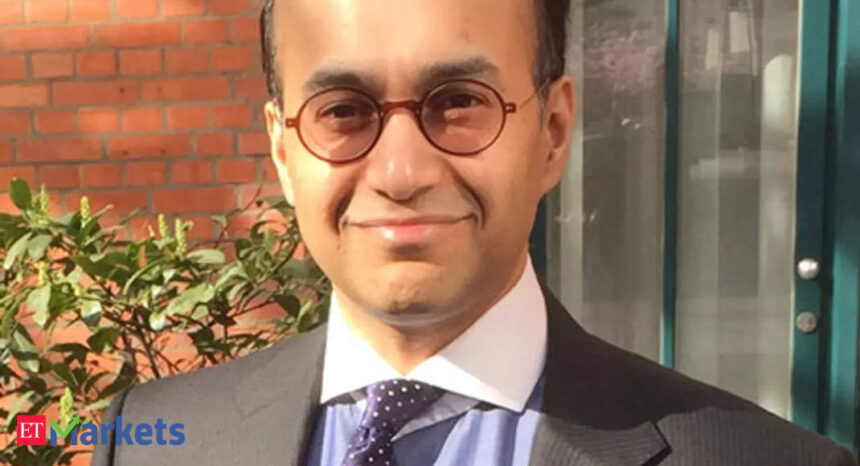It is a reality for several reasons. One is that manufacturing in Europe has become very expensive. China has had its own set of problems, whether it has to do with the whole response to Covid and the way the lockdowns affected manufacturing and shipment from China to issues that countries are having with China. So everybody wants to de-risk themselves from China, because if China were to stop exporting to you tomorrow, what would happen? People are comfortable with India. People have built long relationships and have good experience of working with India in the IT space. Indian people and Indian capability is well respected. And Indian manufacturing has also made its mark in various fields. I think people see India and its whole population pyramid, its entrepreneurism, its education, its skilled manpower as one of the biggest untapped opportunities to grow Indian manufacturing and global manufacturing.
The traditional argument has been that India is not competitive enough. They cannot be a reliable partner and that is something which has hurt us, whether it comes to textiles and with the exception of autos and some specialised companies like Bharat Forge, the number of success stories are very limited. Why is that?
In India, things happen because of exceptional efforts by entrepreneurs to make something happen. We do not have a cohesive policy that really supports a sector. In China, you have whole towns which are built around one industry. It could be from furniture to toys to electronics to whatever. Now, I feel the whole PLI movement is in a way negating that disadvantage we have and putting some winds behind our sails.
If you take entrepreneurism, if you take availability of technology, you take digital technology and digital manufacturing, PLI plus the fact that the West has lost its competitive advantage, not just competitive advantage, but the will to manufacture because they do not have people who want to get into manufacturing. A lot of people have gone out of the workplace or out of the workforce post-Covid. All these have led to this vacuum being created, which India can take up very quickly.
The second factor is that India is going to be a big driver of global growth and global demand. I often used to say that China has built infrastructure for their grandchildren and we are still building for our grandparents. I mean, our cities are underdeveloped from any point of view and India needs to urbanise at a pace which we have never seen. And if that has to happen, we have to build a huge amount of infrastructure. And building all that infrastructure, Make in India is going to be the way forward. If you put all those pieces of the puzzle together, Indian manufacturing is going to grow from 15-16% to 25% of our GDP and a GDP which will be by 2030 at least double of what it is now.
So, when will the operating leverage for the defence business kick in on the aggregate balance sheet?
You will start seeing that by Q4. I think this year will be the year of big growth but the real growth will come next year as well.
We are at your R&D centre, the Tony Spark kind of a workshop. All excitement, all gadgets, all equipment. What is the space that you are entering?
So, this is the Kalyani Centre for Technology and Innovation. We have two centres here. The Kalyani Centre for Technology Innovation and the Kalyani Centre for Manufacturing Innovation. Technology innovation focuses on fundamental technology, material development, material testing and stuff like that. In the Kalyani Centre for Manufacturing Innovation, we take the technologies that we develop there, the knowledge we develop and convert it into products. Here we have everything from jet engines which we test, which we have made ourselves to making gearboxes for helicopters, to making extremely advanced drones, unmanned aerial vehicles, unmanned ground vehicles, electric vehicles, things for defence that are behind those screens which we cannot show you.
We look forward to seeing that. What is this?
This is an unmanned ground vehicle that we built. It is electric plus engine operated. So, the engine can charge the battery. It can work in fully silent mode or it can use the engine to charge the battery and increase the range and it is fully amphibious. It can even go through water. Basically, we built this for patrolling sensitive facilities like during Pulwama, how people infiltrated our base and attacked. You can put a remote control weapon station on this. You can put a tranquilizer gun on it. You can do anything you want with it and these can work as a swarm. There are two-three of them that can work together to pin people. You can work with the small one and the big one together. There is a 6×6, also a 4×4. This has a hybrid electric drive which means it has an engine and a battery, but the drive is by electric motor. So, it can run in fully silent mode. It can go up to about 20 kilometres an hour and it can climb 30 degrees. It has got a silent capability of about six to eight hours and almost 12 hours in hybrid mode and it can go through water as well. It runs off of a remote control. It has a large range of some 8-10 kilometres and it has got full IR sensor and camera on top, so you can see in day and night plus you can do thermal imaging.
If you were to mount any kind of payload on it, you can even put a stretcher on it if you want to bring someone who is injured or can carry some cargo. It is a multi-purpose vehicle. Basically where you have to do patrolling and it may be hazardous and you do not want to risk the life of someone this can do patrolling in a dumb manner or an intelligent manner and it can also be connected by link to a drone which will give a overhead picture and that drone and this together can work to find someone and triangulate and pin them down, incapacitate them or do whatever else is needed.
So, if you take the clock back and if one looks at the construct of Bharat Forge, there was a time it was 100% automotive, then came the engineering and industrial business and now it is defence, EV and large industrial. How will the migration be from Bharat Forge of 2023 to 2025 and 2028?
In Bharat Forge of 2023, defence is still a business that is going from incubation into production; EV is still being incubated, aerospace is still being incubated, industrial is growing and we have added a bolt-on acquisition. In 2025, defence will have reached some amount of maturity.
It will be profit making for you?
Oh, absolutely. Defence will be profitable this year and I would say very profitable, it will not be dilutive to our profits. Aerospace is also growing. It has grown almost 100% all over last year to this year. It will continue to grow. We have a large pipeline, also very profitable. EV by 25 will go from incubation to revenue and should be profitable. By 2028, defence will have matured. It will have become a serious business with two or three verticals within it and each one with its own growth opportunities and global growth opportunities. If you look at our defence business today, we have an order book of over Rs 2,000 crore and that is all exports.
So, all the vehicles are meant for exports?
No, this is still a proto stage. What we have in the other plant are what we are already exporting, which are our guns and our mounted guns and vehicles. Then, aerospace will be a high growth business. EV will have matured and by 2030, all these will have matured and will be in a stage where there will be a platform business which then becomes a business which can start growing on its own, even start doing M&A of its own or consolidation within India of its own and further products and geographies, etc.
Then there is the geographical breakup of the Class 8 trucks sales numbers with which markets are obsessed.
But honestly class 8 as a percentage of our revenue is less than 15%.
And if the migration to EV, defence and aerospace continues, by 2027-28, it will be less than 10%.
The same products will become far less than 10%.
One number which markets and shareholders always look at is ROCE. Your ROCE has fluctuated in the last couple of years. Is that largely because of investments?
It is because of investments and please understand it took 12 years for us to incubate our defence business. It will take less than that for our EV business. It has taken less than that for industrial. Our overseas businesses have taken longer because nobody could anticipate Covid and what it has done but our ROCE targets are well in excess of 20% and I am confident that by 2025 we will be well in excess of 20%, 22-23% or so.
That also means that you are assuming your global business will come back; it has to normalise?
It will come back, of course it will come back. Our European business will be profitable this year and our US business will head towards profitability by the end of this year and by next year that also should be profitable.
So, what Bharat Forge has achieved in the last five years, you are likely to achieve that in the next two years?
I hope so.
Because for you all your businesses now are firing full cylinders, you are ready, capex is done …
Capex is done but we also need to do more capex as we announced in our results call. We will invest slightly over Rs 1,000 crore in the next 24 months or so, in both our conventional business, in EV, in aerospace and in industrial.
What are you doing to increase the moat around your business? Good companies always focus on that, how can they make the company more distinctive?
We are increasing our moat by doing three things. One, in our existing business, we will become the last man standing, which means the highest quality, the highest capability of engineering, most competitive cost-wise and unmatched financial strength. In new areas, we will be lean, mean and hungry and we will use technology to drive our business and we will continuously reduce cost and we will use technology to reduce cost and we have an amazing technology platform that we have in place now which is going to help us increase our productivity quite dramatically while reducing cost so that is what we will do to increase our moat.
The last thing you have to do to increase your moat is increase your customer affinity or your customer relationship and that has to be through engagement, bringing value to your customer and that is something we do through technology.
The fact that you are increasing into and spreading yourself into new areas means more customer interaction.
Yes.
More deep understanding of supply chain.
Yes.
More and more agility to adapt and more and more reliability of the customer on your business.
Yes.
There are too many wheels within wheels.
Yes.
I know you are in the wheels business. You have to keep on managing the mechanics there but this is a business strategy which has to change optically and very strongly for you.
We have clearly recognised this and brought in a lot of high-quality management at the vertical level to look after each one of these aspects because you cannot run it as one monolithic business. You have to run them as five separate businesses reporting into one and also using fungible assets within each other.
Will Bharat Forge eventually be a holding company where some of the subsidiaries could list?
No, I would never call it a holding company but Bharat Forge will be a company that will create a lot of new companies within it.
But for the Kalyani Group there are some companies which are listed outside Bharat Forge.
Yes.
The fact that you are focusing right now on the engineering progress and those are small subsidiaries and small businesses, does it make commercial sense for you to list them or even regulatory sense for you to continue to list them?
Like a steel business?
Yes.
It has historically been listed, it is 50 years old. In our country things that happen once become very difficult to undo.
One AGM every year, a couple of board meetings every year and more paperwork for you.
That is okay but they are good businesses and those businesses will also grow. Please understand those businesses are a very big strength to us because we would not be exporting as much product if we did not have the quality of steel that we do which we get because of having our own steel companies. Also, many other companies buy our steel and export also because our steel that we have to use is approved by our global customers. So once it is approved by one global customer, there are many other consumers who consume it.
It is a backward integration.
Absolutely and that is a big advantage.
For Bharat Forge in short term (1-3 years), what is the opportunity and what is the challenge? 3-5 years is medium term and five years plus is vision.
For the short term very clearly is to turn around our global businesses, grow them, maximize the growth of our defence business, grow our acquired industrial businesses, continue growing our aerospace business with whatever capex we already have done and continue growing our component business. That should give us a 15% plus CAGR. Sometimes it will be higher, sometimes it will be lower but that is what we expect.
Then for the medium term, three to five years, build the defence business into a whole meaningful business going from Rs 1,000 crore to Rs 4,000-5,000 crore; industrial business from Rs 2,000-2,500 crore to Rs 4,000-5,000 crores; hopefully take aerospace to a 100 million plus business and EV to 200 million, if not more. That is the way we look at the five-year horizon. EV in my opinion could even be bigger than that.
If I say what happens in the market in the short term is a function of price discovery, for an entrepreneur for Bharat Forge there are good days ahead?
Good days will come because either as a company or as promoters we do not have any stress. The company is not loaded with debt. We have lots of opportunities. We have great people. Our biggest strength more than anything else is the phenomenal people we have in every part of our business right from the shop floor to the engineering to sales and marketing everyone. They are very passionate about what we do and to harness that passion and to get the most out of that passion is really what is the job of management.
What is a day like in your life? What time does he get up? What time does he sleep?
I should be waking up earlier but I probably wake up around seven and I sleep close to midnight. I read at night and I read a lot of stuff online. I try to follow what is happening in technology and trends and I follow a lot of these technology channels.
How do you keep yourself up because technology is so dynamic?
You know what, I understand what I do not understand.So, I have a good tutor at home, my son who or my daughters bring me up to speed and then of course we have our CTO, CIO who all bring us up to speed on this as well.
If there is a billboard which has just one mantra which you believe in, what would that billboard be and what would that mantra on the billboard be?
I have one poster in my room that says what if everyone is wrong and you are right?
Do you really apply that?
I believe that do not follow the herd.
That helped you during Covid?
Definitely and this is a lesson I learnt from my father that do not follow the herd but everybody follows what is easy to do. What is difficult to do is what makes you successful. Developing technology on your own, spending 12 years developing your own products when nobody gave you a chance, that is what makes you different, makes you unique and makes you a champion.








